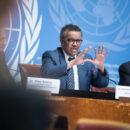
Debating Ideas is a new section run separately from the main African Arguments site. It aims to reflect the values and editorial ethos of the African Arguments book series, publishing engaged, often radical, scholarship, original and activist writing from within the African continent and beyond.

“The Zimbabwean Delegation to the WHO WHA63”
The is no global public health priority of greater urgency than the quest to find an effective vaccine to prevent infection by SARS-Cov-2 the virus that causes coronavirus disease 2 or therapies that can slow down, cure or improve survival of those with Covid-19. It is a standard international requirement that medical products should be tested in the target group in which their use is intended to ensure that relevant pharmacogenetic and immunogenetic data is collected to inform the development of appropriate treatment guidelines for that population. This means that a product to treat sickle cell anemia, a disease that almost exclusively affects black people should be tested in black people in order that relevant and accurate data on how that group responds to that treatment is produced. Similarly, medical products for Covid-19 must be tested in all affected people globally including on African populations.
Currently, there are no approved therapies or vaccines for SARS-CoV-2. Scientists estimate that an approved vaccine is likely to take an estimated 12-18 month using the currently accelerated development pathway. Ongoing clinical trials to test whether products under development are safe and effective are mainly concentrated in areas that have been badly hit by Covid-19 and have strong R&D infrastructure in Europe, the US as well as in India and China. The most advanced vaccine trial is for BCG that was used against tuberculosis and is in phase 2 and 3 Covid-19 trial in the US. So far, all six phase 1 vaccine trials are being done in Europe, the US and China and thirty-nine phase 1 vaccine trials are being conducted in Europe, the US, India and China. My former colleagues at the University of Oxford Jenner Institute initiated the first human SARS-Cov-2 vaccine clinical trial on the 24th of April, the first one in Europe. Out of all currently ongoing vaccine trials, there are no vaccine trials being done in any country in Africa according Africa CDC’s latest clinical briefing on 7 May 2020.
According to the Africa CDC, during a Covid-19 regional clinical briefing on 30 April, a limited number of African countries are currently participating in Covid-19 clinical trials for therapeutic products. Of Africa’s 54 countries, only Zambia, Nigeria, Tunisia and Egypt are participating in the global Solidarity Clinical Trials. The Solidarity trial was designed by the WHO to achieve speed and scale in generating results faster by allowing multiple countries to participate using simplified procedures that enable even the most inundated hospitals to participate. Amongst the therapeutic products in clinicals trials are those previously tested for treating viruses in the same family as SARS-Cov-2 like Ebola and HIV, such as remdesivir, lopinavir/ritonavir, systemic interferons and antibody therapies.
Africa CDC and WHO Africa’s aggressive highly targeted and well-coordinated multilateral response to Covid-19 was successful at reducing the rate of transmission and slowing down Covid-19 spread during the first 100 days of the pandemic. This prevented weak African health systems from quickly becoming overburdened and collapsing, like what happened in some countries in Europe, and gave WHO Africa cautious optimism that the Africa region might manage to contain SARS-Cov-2 virus in many of its countries if interventions to mitigate and contain the virus continue to be effective. The most feasible and practical intervention for Africa is an effective vaccine to prevent infection or reduce disease severity. A vaccine accessible to all is what the global community needs to bring Covid-19 under control. Social distancing measures that have been successful at slowing down early spread in Africa are not feasible or sustainable in the long term for a continent of 1.3 billion people who lack social protection and access to healthcare infrastructure for critical Covid-19 care.

Author, Dr Lenias Hwenda with the WHO DG Dr Margaret Chan
As time passes, community spread which is now established in African countries will drive an inexorable increase in case numbers just as the worst affected countries like Italy, Spain, the UK and the US are beginning to bring their own Covid-19 national situations under control. Already, recent emerging reports of sudden unexplained spikes in deaths in Kano State in Nigeria are raising grave concerns. A significant increase in Covid-19 cases in Africa has the potential to seed new waves of global SARS-Cov-2 transmission and reverse the gains of countries currently overwhelmed by Covid-19 or those that have brought it under control.
Africa’s fate and that of the world are inexorably tied. What happens in Africa and whether it will be able to access a vaccine will affect global progress in bringing Covid-19 under control.
For this reason, Africa should be invested in efforts to develop an effective vaccine through participation in clinical trials in order to expedite the development of a vaccine it needs to avert a potential catastrophic loss of life that could occur if Covid-19 overwhelms its systems’ responsive capabilities.
However, to date, few African governments appear to be engaging in facilitating their nations’ participation in global efforts to clinically test Covid-19 vaccines and therapies to ensure that they appropriately serve the treatment needs of Africans. A possible explanation for lack of engagement by African governments could be that they are reluctant to facilitate their nations’ trial participation following their wide condemnation of the suggestions of two French scientists that Covid-19 clinical trials should be done in Africa where lower standards than required in Western countries can be used. The comments caused such political outrage that the WHO Director General Dr Tedros Ghebreyesus called them “a colonial mentality” and Africans in their respective countries launched social media campaigns discouraging their fellow citizens from participating in Covid-19 clinical trials. The social media campaigns may not significantly deter clinical trial recruitment in Africa communities, but it is a real possibility that wary government leaders may choose that their nations should not participate in the Covid-19 clinical trials in order to protect their citizens from being exploited. After all, it is government’s responsibility to protect clinical trial subjects from harm through their regulatory agencies, but any decision to abstain from participation must take into consideration the potential implications for future access to vaccines and therapeutics.
The French scientists’ comments provide ample warning that some scientists are willing to exploit the pandemic emergency as justification for granting exceptions that require less rigorous scientific enquiry which leaves clinical trial participants vulnerable to potential harm. This risk is legitimate and real. Even the most stringent and well-resourced regulatory authorities like the US Food and Drug Administration (USFDA) have documented outcomes of regulatory inspections of clinical trial sites in which they uncovered clinical malpractices that include failure to obtain informed consent, falsification of data, or violations in reporting adverse events.
What is needed instead is greater vigilance and better governance of clinical trials within African communities to ensure adequate protection of clinical trial participants. National regulators and ethics committees must be extra vigilant and take additional measures if necessary, to protect clinical trial subjects. Governments can use collaborative approaches to overcome the growing complexity of biomedical research and draw on the existing capacity-building platforms for improving the regulatory oversight of clinical trials conducted in Africa.
African Union (AU) member states have already agreed on a Strategic Plan that aligns with the objectives of the African Medicines Regulatory Harmonization by pooling regulatory and ethics expertise in clinical trial review and approval though the African Vaccines Regulatory Forum (AVAREF). AVAREF is a regional technical committee of the African Medicines Regulatory Harmonization Initiative. Its purpose is to facilitate cooperation between national regulatory authorities and ethics committees to conduct joint reviews whilst allowing each country to retain responsibility for granting regulatory approval. Participating regulatory agencies are able to maintain country specific requirements without compromising on the protection of their citizens. Harmonized standards and approaches help to accelerate the review of vaccines of high public health importance such as those against Ebola and Covid-19. AVAREF has already successfully applied its approach to vaccines against meningitis, malaria, rotavirus, pneumococcal pneumonia and Ebola. It will now facilitate the participation of multiple countries and expedite new products for the Covid-19 pandemic.
Africa CDC has also highlighted the need to improve Africa’s engagement and build trust in Covid-19 clinical trials through participation of African scientists in clinical trials in Africa conducted by international research consortia. Few of the many clinical trials to find effective vaccines or therapeutics for Covid-19 have meaningful participation by African scientists. Improved participation should be aided by the fact that Africa has highly capable scientists of global repute who have successful led clinical trials that benefitted the continent and the world. For example, the Ebola Virus Disease ring vaccine trial in West Africa in 2014 was critical in ending the outbreak and the trial of Mab 114 monoclonal antibody that led to a therapy for Ebola Virus Disease in the Democratic Republic of Congo.
Individuals within African communities can also play an important role by demanding government accountability for implementing regulatory and ethical policies and legislation that exist to protect clinical trial subjects. Individuals can also represent their communities on ethical committees which are legally required to review and approve any clinical trial studies to be done within any community in the world.
Infectious diseases pose a threat to any and all nations’ national security. Therefore, standards applied in clinical trials anywhere should concern the global community. Scientists willing to exploit weak regulatory frameworks in Africa are a risk to every country where potential lapses in regulatory processes could be equally exploited. Exclusion of Africa from participating in clinical trials either by design or neglecting to engage will only harm the public health interests of Africa and the global community.
The current global context is one of severe shortages of basic medical products for the Covid-19 response like personal protective equipment and infection and prevention. Every country in the world, rich or poor alike is facing shortages because global manufacturing capacity does not exist to meet extraordinary demand of this magnitude. Global manufacturing capacity for a vaccine is certain to be equally inadequate in the face of such enormous global demand. This will limit who can access it. Access priority is often given to communities that participated in clinical trials. Groups that did not participate in clinical trials and for whom genetically relevant and statistically significant data is not yet available may not be able to access the vaccine until such data becomes available through further studies. The decision of African leaders should be guided by Africa’s need for an effective vaccine that it can immediately access. Countries can participate whilst acknowledging the risks and putting in place mitigation measures to protect citizens. Countries should avoid inadvertently creating a perfect opportunity for eliminating Africans from immediate access to a scarce vaccine in the future.






